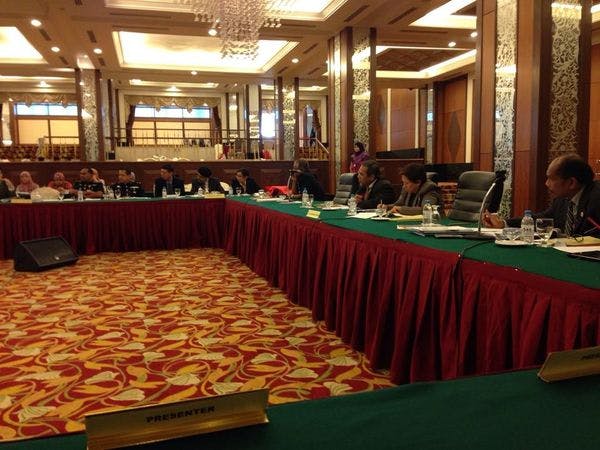Improving human rights for people living with HIV and people who use drugs in Malaysia
In the month of December 2013, the Policy Team under the European Union-funded Asia Action project organized two events aimed towards improving the human rights environment surrounding people living with HIV and people who use drugs. The first was a Drug Law Reform Parliamentary Roundtable held in the Parliament House in Kuala Lumpur, and the second a workshop/training session with the Royal Malaysia Police aimed towards increasing Police Leadership in Public Health. Details are as follows:
Drug Law Reform Parliamentary Roundtable, 3 Dec 2013
The Parliamentary Roundtable was organized with the intention of discussing four proposed amendments to the Dangerous Drugs Act 1952, and the Drug Dependents (Treatment and Rehabilitation) Act 1983, including reducing the remand period of 14 days, replacing jail and corporal punishment sentences for drug use and drug possession in small amounts with diversion to health, and a revision of the definition of dependence in the Act.
There were five presentations focused on separate themes: Asia Action Policy Manager Fifa Rahman commenced with a presentation debunking misconceptions of diversion and de facto decriminalization, and showing benefits gained by police. Two of her slides are inserted below.
The event continued with a presentation on evidence arising in Malaysia by University of Malaya Dean of Medicine Prof Dr Adeeba Kamarulzaman. Key statistics arising from this were the fact that a majority of prison officers in Malaysia have latent tuberculosis, and that as a result of voluntary outpatient services at Cure & Care clinics, over 76.8% of patients enrolled reported stable housing. Throughout the presentation, participants were enlightened as to several other statistics that proved that health and harm reduction measures were yielding positive results.
The third presentation was given by Prof Alex Wodak, one of the pioneers of harm reduction in Australia. He spoke mainly about international drug policy. Former Bar Council President Ragunath Kesavan spoke about the rationale for reducing 14 day remand, including emphasis on the fact that drug users do not have access to ARVs or methadone during that time, and that this excessive remand period was contrary to the rule of law.
By far, the highlight of the day was a presentation by former drug user Manje, who said that she was imprisoned for drug use, and that she was never given a chance to get treatment because she was always being arrested. Importantly, she said: “There was not one day that went by that I did not want to quit.”
Discussion thereon was very interesting. Director of Narcotics of the Royal Malaysia Police, Dato’ Noor Rashid Ibrahim said that the police don’t really focus too much on arresting drug users, but more on drug traffickers. This comment may suggest that the police are moving slowly towards an ideology shift. Oddly, the Anti-Drug NGO called Pemadam maintained that no one in Malaysia is arrested for drug use. This point was promptly rebutted by Fifa Rahman, Prof Adeeba Kamarulzaman, and also by way of Manje’s testimony. Member of Parliament Mr Liew Chin Tong suggested the formation of a Parliamentary Select Committee on Drugs Matters.
In closing, Minister Nancy Shukri said that she agreed that a proposal be made to carry out a Parliamentary Select Committee on Drugs Matters. The Asia Action team at MAC will proceed in January 2014 to draft this proposal.
Police Leadership in Public Health workshop, 12-13 December 2013
The workshop was centred around benefits of harm reduction to police, including reduction of crime, reduction of workload, and increased work satisfaction. Participants were given the official NSEP Police Standard Operating Procedure document, which all of them said that they had NEVER seen. They were also given the Malaysian AIDS Council report on the Australia Study Tour, which was explained to them. Key points explained included the benefits to police of providing methadone & ARVs in police custody centres or lockups. Group activities were centred around the issue of corruption and extortion from drug users. Interesting quotes that arose from this session included, “When we are corrupt, my heart is not calm”. Police participants also said that police salaries should increase to prevent corruption.
Based on discussions and feedback from participants and organisers, we have concluded that future action points include a roadshow to meet Officers in Charge of Police Stations (OCPDs), and a half day meeting with Senior Police Officers to discuss the Pilot Project on Access to Medicines in Lockup Centres.
Keep up-to-date with drug policy developments by subscribing to the IDPC Monthly Alert.
